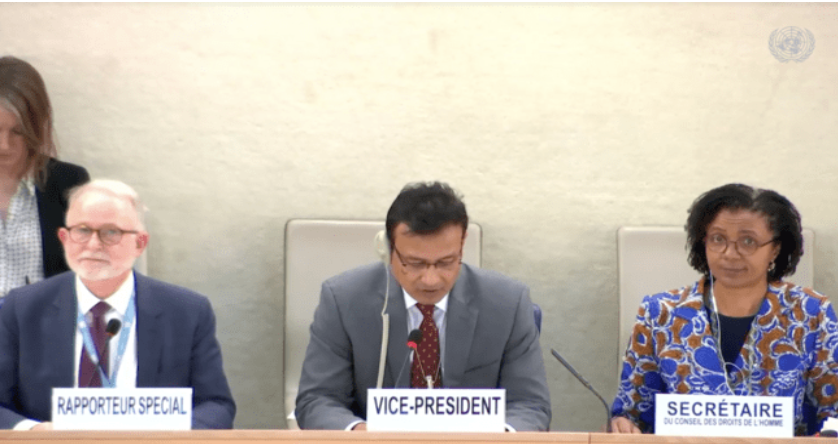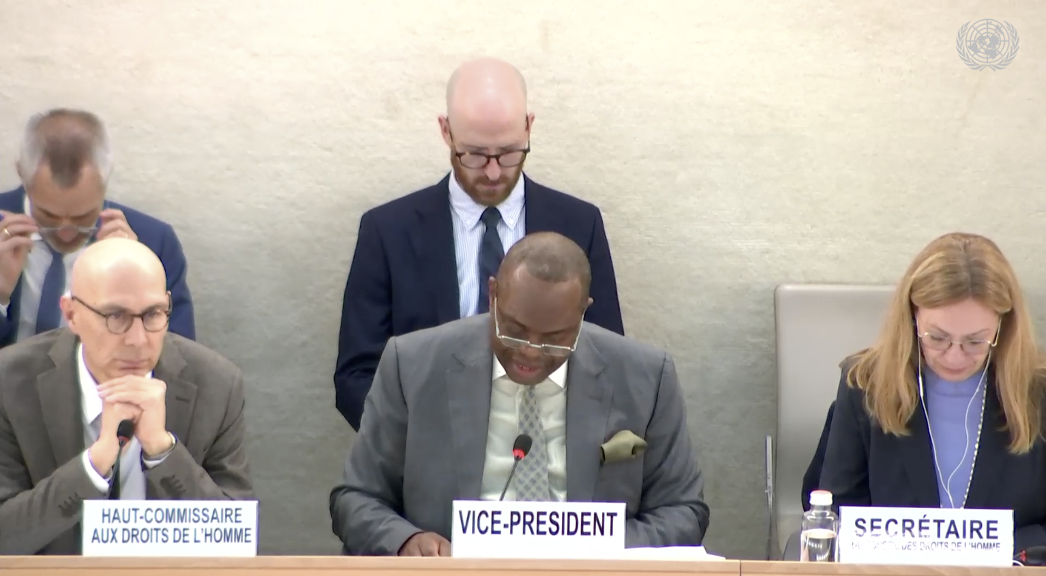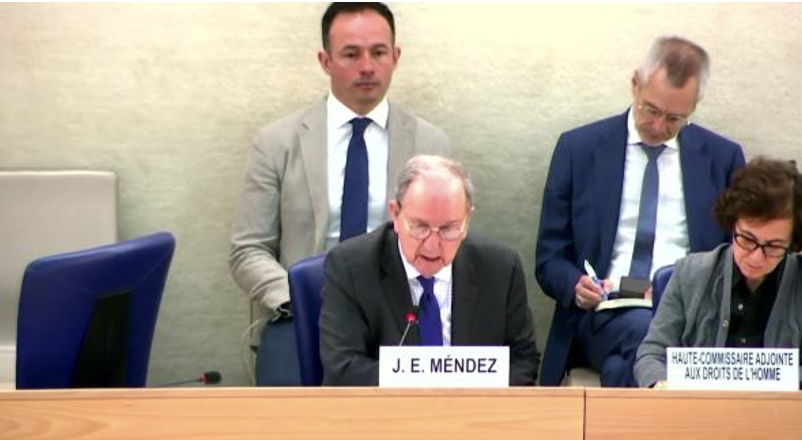The 57th Session of the Human Rights Council
09 September – 11 October 2024
Item 4: Human rights situations that require the Council’s attention
20 September 2024
By Milagros Begoña Cano Cernuda/ GICJ
Executive summary
In response to increasing concerns about severe human rights violations in Venezuela, the Human Rights Council established the Independent International Fact-Finding Mission on the Bolivarian Republic of Venezuela in September 2019 through Resolution 42/25. The mission’s mandate focuses on investigating gross human rights violations, including extrajudicial killings, enforced disappearances, arbitrary detention, torture, and gender-based violence, committed since 2014.
This report provides an update covering the period between 1 September 2023 and 31 August 2024, with a focus on violations during the post-election crisis following the presidential election on 28 July 2024. After President Maduro was declared the winner, the Government of Venezuela increased its repression against opposition voices, leading to protests, which were met with State violence and repressive tactics. These actions represent one of the country’s most acute crises in recent years.
The mission's investigations are now focus on the upsurge of human rights violations following the election. Due to ongoing threats against victims and witnesses, this report provides an analysis of patterns of abuse rather than an exhaustive account of individual cases. Continued investigation is essential to address impunity and to hold perpetrators accountable. The mission’s final phase of investigating the role of the Bolivarian National Guard in violations since 2014 has been postponed, pending a renewal of its mandate by the Human Rights Council.
Background
Venezuela has been in a prolonged state of political and social crisis since the early 2010s, with deteriorating human rights conditions and widespread allegations of state-sponsored repression. The Independent International Fact-Finding Mission on Venezuela was established by the United Nations Human Rights Council on 27 September 2019, through Resolution 42/25, to investigate gross human rights violations committed since 2014.
The mission’s work has been critical in documenting State actions such as extrajudicial killings, enforced disappearances, arbitrary detentions, and acts of torture. The mission has also focused on investigating sexual and gender-based violence, particularly against those perceived as opponents of the government. The repressive tactics intensified during the lead-up to the presidential election in July 2024, with state actors using violence and intimidation to silence political opposition.
In response to growing political tensions, allegations of election fraud, and mass protests following the announcement of President Nicolás Maduro's victory, the Venezuelan government reacted with increased repression. The mission’s findings indicate that these actions, carried out by State security forces, represent a continuation of a policy designed to stifle dissent and perpetuate the government’s hold on power.
The mission’s ongoing efforts aim to document these violations, with the goal of holding those responsible for these crimes accountable and ensuring justice for victims. The mission has faced significant challenges due to the volatile situation in the country and risks to witnesses and victims. Yet, it, remains committed to fulfilling its mandate of ensuring accountability for human rights violations during this prolonged crisis.
Report of FFM Updates
To begin with, the oral update is that Venezuela has experienced human rights violations and an acute political and social crisis, particularly following the presidential election on 28 July 2024. The report emphasised that the government, in its effort to suppress dissent, reactivated its repressive apparatus, which led to widespread human rights violations. The civilian population, especially those perceived as opponents of the government, continues to face violent repression, including cases of killings, arbitrary detentions, torture, and gender-based violence.
It also highlights the challenges the Fact-Finding Mission (FFM) has faced since its establishment in 2019, particularly after the election, when the situation in the country deteriorated further. Despite these challenges, the mission has been able to collect substantial evidence, including testimonies from victims and witnesses and, audiovisual documentation. This evidence has been crucial in understanding the systemic nature of state repression against opposition voices.
While waiting for a more stable operational environment within Venezuela, the mission initiated contact with the Venezuelan government and neighbouring countries to secure access to those affected by the violence, including protesters, activists, and human rights defenders. Countries like Colombia and Brazil, where many Venezuelans have fled, have cooperated, allowing the mission to interview victims and witnesses of the repression. The FFM is working to visit other neighbouring states to continue gathering firsthand information from those displaced by the violence.
The update presented key findings from the mission's latest investigations. He reported that, there have been numerous arbitrary detentions since the election, with the mission documenting 49 such cases during the reporting period. Most of these detainees were subjected to due process violations, and many experienced torture or inhuman treatment. He noted that these detentions were part of a broader pattern of repression against perceived political opponents of the government.
The mission also documented 25 deaths in the context of protests in late July 2024. The victims were overwhelmingly young men, with two minors among those killed. The investigation revealed that 24 of these deaths were caused by gunshot wounds, with security forces and armed civilians believed to be responsible. The mission continues to investigate these killings to establish accountability.
Additionally, it was expressed concern over the situation of sexual and gender-based violence, which has been used as a tool of repression, mainly targeting women activists and political opponents. The FFM is currently investigating numerous cases of sexual violence that occurred during and after the election period, and initial findings indicate that these acts were systematic and aimed at silencing dissent.
In conclusion, it urged the international community to remain vigilant and continue supporting the FFM’s work. He emphasised that the repressive apparatus in Venezuela remains a significant threat to human rights and called for renewed efforts to hold perpetrators accountable. He appealed to the Human Rights Council to extend the mission’s mandate, as more work is needed to bring justice to the victims and to address the deep-rooted culture of impunity that has allowed these violations to persist.
It ended by stating that the Venezuelan people are still enduring profound repression, and their voices must be heard. It was called for coordinated international pressure on the Venezuelan government to protect human rights and restore civic and democratic space in the country.
Interactive Dialogue with Delegates
Venezuela
Mr Alexander Gabriel Yánez Deleuze began by sharply criticizing what he referred to as a "ridiculous pamphlet" drafted by an illegitimate mission following orders from Washington. He condemned the report as a tool for regime change against the legitimate government of Venezuela. According to him, the political reports presented to the Council are of little consequence and show a concerning decline in the United Nations credibility. He further argued that Western countries use the Council as coercion and political pressure against sovereign nations in the Global South.
Mr Yánez Deleuze highlighted the vulgarity of the report, accusing it of attempting to impose the narrative of the Venezuelan far-right on the international community. He also raised the alarm over what he described as the resurgence of fascism and neo-Nazism, noting that these dangerous political currents are spreading with the support of the United States, the European Union, and high-ranking officials within the international system.
Ecuador, on behalf of Argentina, Paraguay, Uruguay, Canada, Chile, Guatemala, and Ecuador
Speaking on behalf of Argentina, Paraguay, Uruguay, Canada, Chile, Guatemala, and Ecuador, Ms Patricia María Borja Hidalgo aligned these nations with Fact-Finding Mission (FFM) findings. She called on the Venezuelan government to halt the intensified repression following the recent elections and to investigate alleged human rights violations, which may amount to crimes against humanity under the jurisdiction of the International Criminal Court (ICC).
Ms Borja Hidalgo expressed concern over the lack of independence of key Venezuelan institutions, such as the National Electoral Council and the Supreme Court. She pointed out that their recent rulings undermine the rule of law and further deteriorate the country’s human rights situation. She supported the renewal of the FFM's mandate and called for full cooperation from the Venezuelan government.
Australia
Mr Peter Alliott, representing Australia, expressed deep concern over the findings of the FFM. He highlighted the significant deterioration of human rights in Venezuela, particularly following the elections held on 28 July. He was troubled by reports of political violence leading to deaths and injuries, as well as a rise in arbitrary detentions.
Australia called on the Venezuelan authorities to respect fundamental freedoms, including the right to assembly and freedom of expression, and to release all those arbitrarily detained. Mr Alliott also emphasised the need for transparency and accountability, urging the Venezuelan government to publish detailed election results. He asked the international community to consider what steps could be taken to ensure that the electoral outcomes genuinely reflect the will of the Venezuelan people and respect democratic principles.
Democratic People's Republic of Korea (North Korea)
Mr Pang Kwang Hyo of the Democratic People's Republic of Korea expressed strong solidarity with the government of the Bolivarian Republic of Venezuela. He commended Venezuela for its sincere efforts and progress in human rights despite the unilateral coercive measures imposed on the country.
North Korea firmly rejected any attempts to undermine the results of Venezuela’s elections, criticising foreign interference in the nation's right to self-determination. Mr Pang emphasised respecting the principles outlined in the UN Charter, particularly regarding non-interference and sovereignty. He urged the Council to promote dialogue and cooperation rather than impose sanctions or pressure.
Canada
Mr Peter Macdougall, representing Canada, thanked the FFM for its thorough investigation. He expressed grave concern over the worsening human rights situation in Venezuela, particularly the spike in repression leading up to and following the recent elections. He noted that more than 2,000 people, including minors, had been arbitrarily detained for participating in protests.
Mr Macdougall condemned the forced disappearances and deaths of protesters, as well as the persecution of political leaders, civil society actors, and independent journalists. He called on the Venezuelan government to cease its repression and to re-engage with international human rights mechanisms, including the UN Office of the High Commissioner for Human Rights (OHCHR).
Nicaragua
Ms Rosalía Concepión Bohorquez, speaking on behalf of Nicaragua, firmly rejected the Human Rights Council’s ongoing interference in Venezuela’s internal affairs. She criticised the resolution establishing the Fact-Finding Mission on Venezuela, an example of the Council's politicisation and selective application of human rights mandates.
Ms Bohorquez emphasised that such mandates violate universal principles of respect for sovereignty and non-interference, as enshrined in the UN Charter. She urged the Council to abandon these politically motivated practices and focus on promoting constructive dialogue and cooperation.
Ukraine
Ms Ganna Zavalykut, representing Ukraine, expressed alarm over the systematic repression revealed by the FFM's findings, particularly the targeting of opposition voices, arbitrary arrests, and forced disappearances. She condemned the violence following Venezuela's 2024 presidential election, which resulted in numerous injuries and mass detentions.
Ukraine called for international accountability, stressing the importance of delivering justice to the victims of these atrocities. Ms Zavalykut emphasised the need for concerted global efforts to hold the Venezuelan authorities accountable for human rights violations.
Cuba
Mr Juan Quintanilla, representing Cuba, condemned the hostile and politically motivated actions of the Human Rights Council against Venezuela. He reiterated Cuba’s opposition to the resolution that created the FFM, describing it as a clear case of double standards and selectivity in the Council’s approach to human rights issues.
Mr Quintanilla stated that the resources spent on the FFM have yielded no tangible impact and criticised the report for lacking objectivity, impartiality, and seriousness. He emphasised that the report disregarded the humanitarian impact of the unilateral coercive measures imposed on Venezuela. Cuba reaffirmed its unwavering support for the Venezuelan people and their democratically elected government.
Switzerland
Mr Jurg Lauber, representing Switzerland, expressed appreciation for the work of the FFM. He voiced concern over the repression faced by human rights defenders, including arbitrary detention and mistreatment. He warned that Venezuela’s new law regulating foreign NGO funding could worsen the situation.
Switzerland deplored the crackdown on opposition candidates in the presidential election and urged the immediate release of all political detainees. Mr Lauber supported the renewal of the FFM’s mandate, emphasising that continued international monitoring is crucial for holding the Venezuelan government accountable for human rights abuses.
China
Ms Shi Qi began by expressing China's opposition to the renewing the FFM mandate in Venezuela, criticising it as a tool for interference in Venezuela’s internal affairs. She highlighted that the mechanism only serves to deepen conflicts, undermine the credibility of the Council, and waste UN resources without yielding any meaningful results. According to China, the illegal interference in Venezuela, including the use of unilateral coercive measures (UCMs), constitutes an attempt at unarmed jurisdiction by the United States, further eroding trust between nations.
Ms. Shi condemned sanctions, asserting that they threaten the livelihood of the Venezuelan people by violating their rights to life, development, and other fundamental human rights. She called on all countries to face the situation and end illegal interventions and UCMs. China congratulated President Nicolás Maduro on his re-election and stressed the importance of respecting the choices of the Venezuelan people. She underscored that Venezuela must be free to pursue its own development path, confident that its citizens can address their internal challenges independently.
Turkey
Mr Ömer Tunç Arslan emphasised Turkey’s hope that Venezuela embarks on a prosperous path where its citizens can fully enjoy human rights and a higher standard of living. He reaffirmed Turkey’s support for Venezuela's dialogue process, underscoring that Venezuela’s challenges, including those related to human rights, can only be resolved through dialogue and cooperation among Venezuelans.
Mr Arslan categorically rejected the use of unilateral coercive measures (UCMs), often mischaracterised as sanctions, stating that they have a devastating impact on Venezuelans’ daily lives. He expressed Turkey’s concern about the broader effects of these measures, not only on Venezuelan citizens but also on those in other nations. Turkey remains committed to constructive cooperation with all relevant sectors and pledged to stand by Venezuela to ensure its stability and prosperity.
South Sudan
Mr Alier Deng Ruai Deng noted the FFM’s report on Venezuela but firmly rejected politicisation and external interference in matters that are the exclusive competence of member states. He stressed the importance of allowing the Venezuelan government and its people to resolve their internal issues peacefully, with negotiation being the best option to avoid destabilisation of the country and the region.
South Sudan called on the international community to respect Venezuela’s sovereignty, territorial integrity, and constitutional and national authorities. To maintain regional stability, Mr Deng urged all parties to recognise that internal issues should be resolved domestically without external interference.
Concluding Remarks
In the concluding remarks, Ms. Shi Qi from China reiterated her country's strong opposition to the renewal of the FFM mandate, calling it a politically motivated mechanism used to interfere in Venezuela's domestic affairs. She stressed that the imposition of unilateral coercive measures (UCMs) undermines trust between nations and violates the fundamental human rights of the Venezuelan people. Ms Qi called on the international community end such interventions. She emphasised that the Venezuelan people must be allowed to determine their path to development without external interference.
Mr Ömer Tunç Arslan of Turkey echoed these sentiments, reiterating his country's rejection of UCMs, which he argued negatively impact the daily lives of Venezuelans and others. He emphasised that the resolution to Venezuela's challenges lies in dialogue and cooperation, and affirmed Turkey’s commitment to standing by Venezuela as it seeks prosperity and stability. He urged all parties to respect Venezuela’s sovereignty and to focus on fostering peace through constructive engagement.
Finally, Mr Alier Deng Ruai Deng of South Sudan emphasised the importance of respecting Venezuela’s sovereignty and territorial integrity. He condemned the politicisation of internal Venezuelan issues and called for the international community to allow the Venezuelan government and people to resolve their issues independently through peaceful negotiations. He warned that external interference risks destabilising both the country and the region and encouraged the international community to support Venezuela's efforts for peace without intervening in its internal affairs.
Together, the delegates stressed the critical need for respecting national sovereignty, rejecting external interference, and allowing Venezuelans the space to resolve their challenges through dialogue and cooperation.
Position of Geneva International Centre for Justice
Geneva International Centre for Justice (GICJ) calls for enhanced cooperation between the Independent International Fact-Finding Mission on Venezuela, the international community, and Member States. GICJ urges all parties involved to advocate for the restoration of democratic processes and human rights in Venezuela while ensuring that those responsible for the ongoing violations and abuses of human rights and international law, mainly since the post-election crisis of July 2024, are held accountable.
GICJ emphasises the need for continuous support to the Fact-Finding Mission on Venezuela financially and through expertise, to ensure it can effectively fulfil its mandate of investigating and documenting violations. This assistance is essential for achieving justice for the Venezuelan people, who continue to suffer under state repression and widespread human rights violations. The GICJ further encourages the international community to increase its efforts in addressing the root causes of the crisis and to provide humanitarian aid to the Venezuelan population, which has been severely affected by the prolonged political and social turmoil.







